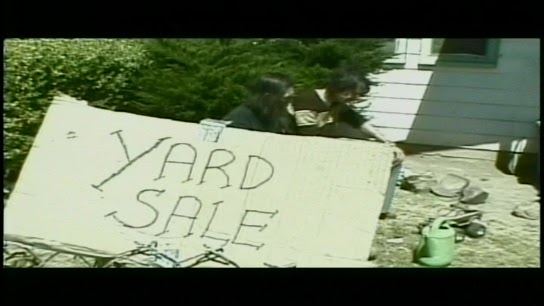Wiggly is the fifteen-minute opening segment (reputed to have been
cut down from a feature length of eighty minutes) about the titular character,
played by Andrews, who is caught in the middle of a family crisis: his agitated
father (Vietnam Ron) wants his camper back from Wiggly’s mother. The new boyfriend of Wiggly’s mom, Mark (Bill
Nowlin), wants Wiggly to kill his father, so the camper can become his new home
with his mom and Mark. Wiggly is also
having trouble with his girlfriend (Tiffany Naylor): she’s not really into his
foot fetish, despite his declaration of true love for her.
Wiggly is one of Andrews’s funniest films and also one of his most
accessible. The film plays out like the
typical dysfunctional drama with the exception that the proceedings are played
out in an only slightly exaggerated fashion.
In other words, Wiggly is
closer to home than most would think. The
portrayal of Wiggly’s father by Vietnam Ron is so relatable: he is so angry that he cannot get back into
his camper that almost every phrase coming out of his mouth is “fuck this, fuck
that, or fuck you.” He cannot even sell
the worthless crap at his garage sale, because he is too angry (to compound
matters, his garage sale appears to be a Sisyphus-like exercise, leading to
more headache). In Wiggly’s only scene
with his mother, the two go from having a polite conversation to his mother
becoming violently overcome with new feelings and emerging with a demonic voice
that threatens to kill Wiggly. Bill
Tyree gives my favorite performance as a senior citizen who attempts to seduce
a volunteer Wiggly while playing a game of tic-tac-toe.
The standout piece is Ants.
Andrews plays Ped (“It’s short for pedestrian”) the happy-go-lucky,
rollerblading son of his documentarian father, again played by Vietnam
Ron. Ped’s father has been making a
documentary on ants for the last twenty years and is in the final stages of
completing his film. He also appears to
heading towards a mental breakdown as well.
As his father finishes his documentary, Ped encounters multiple
people: all the encounters are often
enlightening and hilarious and are most often not random.Ants is about outsiders, artists, and outsider artists. The entire film is populated with outsiders and loners. Ped’s grandfather is homeless (homeless people being the ultimate societal outsiders), and he and Ped have an amusing conversation about his grandfather “not securing his future.” I thought money grew on trees, quips his grandfather, until he looked closer and noticed that they were leaves. In the film’s best scene, Andrews films himself rollerblading alone in a parking lot while the audio plays over an original song by Andrews about rollerblading: it’s a pure film moment and shows Andrews’s adeptness at filmmaking. The main focus of Ants, however, is Ped’s father and his obsession with his documentary about ants. At one point in the film, Ped attempts to dissuade his father from completing the film: he’s worked on it too long and in the end, Ped argues, no one is going to care about watching a film about ants. His father is not deterred: the satisfaction and the joy filming brings him are completely worth all of the trouble, the years spent filming it and the toll it took upon his psyche.
The final piece is The Laundry Room and it is a light, humorous piece (incidentally, the closest to a horror film that I have seen from Andrews). The center of the film is a long, dirty poem recited by Bill Tyree, playing a psychiatrist giving aid to a heartbroken MaryBeth that goes on for at least five minutes. It’s the penultimate dirty limerick, and the rest of The Laundry Room is built around this scene. The film stars Vietnam Ron, again, as a killer stalking a laundry room and looking for victims to take their shoes.






No comments:
Post a Comment